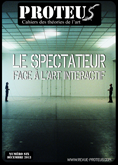La spectation et l’absorption
Abstract
 Télécharger l’article
Télécharger l’article
Paru dans : Proteus n°6

On pense souvent la notion de « spectateur » comme une position face à un mode donné de représentation. Mais on peut également la penser en termes de processus, de rôle, dans le contexte communicationnel particulier que serait la médiation artistique. On pourrait alors parler du rôle du spectateur en termes de spectation — c’est-à-dire la part du spectateur (comme on parle de réalisation pour la part d’un créateur) dans le procès de signification de l’œuvre. La spectation implique l’acceptation (ou non) du rôle spectatoriel que délègue l’œuvre. Le collectif Circumstance propose, avec Our broken Voice et We are Forest, des expériences singulières qui apparaissent comme des cas-limites des arts du « spectacle », de la « représentation » et de « l’interaction ». Il s’agira de comprendre comment ces œuvres disposent leurs spectateurs et d’apprécier les convergences critiques entre elles et les théories de ces trois auteurs. Cela nous permettra de poser quelques bases essentielles d’une théorie contemporaine du processus spectatoriel.
Mots-clés : subtlemobs — spectation — processus spectatoriel — Jacques Rancière — Stanley Cavell
We often think the spectator as a position in front of a representation. We can also think it in terms of process in a particular communication context. Spectatorship could be understood in terms of “spectation” (the spectatorial equal function as we consider “production” for the part of a creator) in the meaningness trial of the work. Through the works Our Broken Voice and We are Forest, the collective of artists Circumstance proposes singular experiences which appear as borderline cases of “show” art, “representational” art and interactive art. It will be a question of understanding how these works incline their spectators and to estimate the critical convergences between them and the theories from these three authors. It will allow us to put forward some essential bases of a contemporary theory of the spectatorial process.
Keywords : subtlemobs — spectation — spectatorial process — Jacques Rancière — Stanley Cavell








